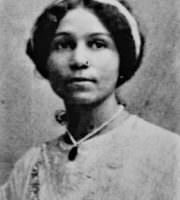About Anne Spencer
Anne Spencer (February 6, 1882 – July 27, 1975), pseudonym of Annie Bethel Spencer (Henry County, February 6, 1882 - Lynchburg, July 27, 1975), was an African-American poet and activist involved with the New Negro Movement and the Harlem Renaissance. She was the first Virginia woman and first African American to have her poetry published in the Norton Anthology of American Poetry.Annie was born in Virginia in Henry County and, after her parents separated, she moved with her mother to West Virginia. She attended Virginia Seminary concluding her studies in 1899, the year in which she met Charles Edward Spencer with whom she married in 1901. The couple had three children, Bethel, Alroy and Chauncey Spencer. From 1903 until his death in 1975, she lived and worked at her home at 1313 Pierce Street in the city of Lynchburg, Virginia, acquiring increasing popularity and a prominent role in the local community and in the National Association for the Advancement of Colored People. She championed equality and educational opportunities for all, and she hosted such figures as Langston Hughes, Marian Anderson, George Washington Carver, Thurgood Marshall, Martin Luther King, James Weldon Johnson, and W.E.B. Du Bois. The Harlem Renaissance allowed her to come into contact with numerous intellectuals and artists including James Weldon Johnson, who appreciated her poetic talent and who suggested that she sign her works as Anne Spencer.
Although Spencer published only thirty poems in her lifetime, she became one of the most respected poets of the Harlem Renaissance, and her work was frequently anthologized. Her poetry appeared in Opportunity, The Crisis Magazine, Survey Graphic, Palms, and all the major anthologies of her day: James Weldon Johnson's The Book of American Negro Poetry (1922), Robert Kerlin's Negro Poets and Their Poems (1923), Alain Locke's The New Negro (1925), Charles S. Johnson's Ebony and Topaz (1927), and Countée Cullen's Caroling Dusk (1927). Known for her nature poetry and feminist themes, Spencer was one of the few women poets to be included in anthologies of the Harlem Renaissance after it was over, so highly regarded was her verse. Charita M. Ford's appreciative essay in Sage (1988), a scholarly journal on black women, demonstrates that Anne Spencer's work is being rediscovered by black feminists who are looking to her as an early ancestress.
Published in 1923 and never reprinted in Spencer's lifetime, her poem White Things was hailed by Keith Clark in Notable Black American Women as the quintessential protest poem. Maureen Honey, who includes fourteen of her poems in an anthology of the Harlem Renaissance, takes special note of White Things as a sophisticated analysis of power lust, portraying the connection between male domination, white supremacy, and the destruction of nature. Greene calls it one of the best poems of racial protest published in twentieth-century America. In The First Wave: Women Poets in America, 1915-1945, William Drake perceptively observes, Many of her poems touch on the theme of a higher spiritual revelation hidden within what is dark, undervalued, or disregarded. He also notes her affinity for Robert Browning and Gerard Manley Hopkins as poets who had a love of gnarled language similar to her own. Drake astutely assesses her technical predilection for clusters of irregular and asymmetrical lines (though she occasionally resorted to conventional rhymed stanzas) in a diction that ranged from the traditionally poetic to the contemporary conversational, emphatic with condensed restlessness.
Spencer's papers are kept at her home, which has been transformed into a museum.
Browse all poems and texts published on Anne Spencer









